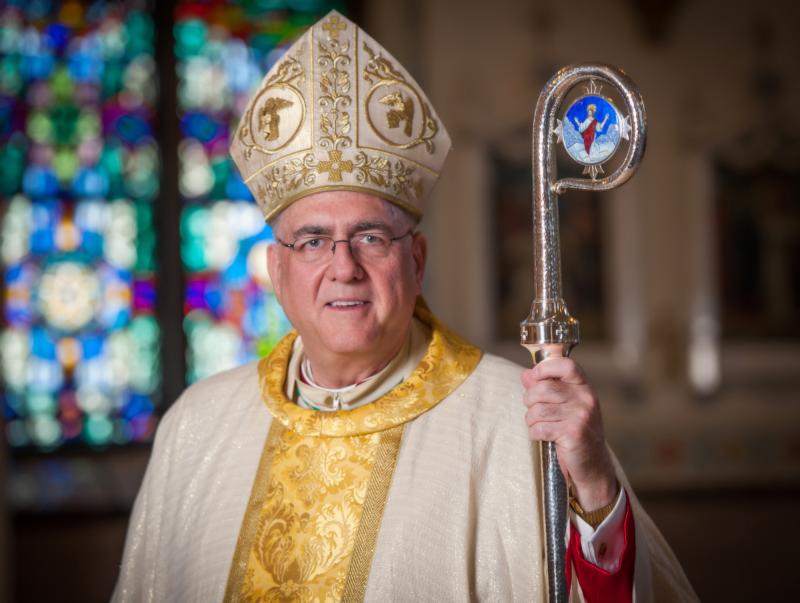
by Archbishop Joseph F. Naumann
Hopefully, we have all developed a personal plan for the Lenten season.
The Gospel for Ash Wednesday, taken from St. Matthew’s account of the Sermon on the Mount, provides us with a blueprint for a fruitful Lent. Jesus speaks about what Our Lord terms “righteous deeds.”
He counsels about three powerful means that can help us grow closer to God: almsgiving, prayer and fasting. Jesus reminds his disciples that if we do good actions for the wrong reasons (namely, to impress other people), we actually deplete them of their power to deepen our friendship with God.
In this column, I want to reflect particularly on the importance of prayer. A couple weeks ago, I wrote about praying, ideally as a family, the daily rosary. Contemplating the face of Jesus with Mary through the daily rosary is a beautiful way to grow closer to Our Lord.
Another great suggestion for Lent 2021 during this Year of St. Joseph is to make a consecration to St. Joseph by using the book by Father Daniel Calloway — “The Consecration to St. Joseph: The Wonders of Our Spiritual Father.” Developing a closer relationship through prayer with St. Joseph would be a wonderful fruit of the 2021 Lenten season.
Bishop Robert Barron in his homily for the First Sunday of Lent spoke about his mother’s custom of participating in daily Mass during Lent.
When he was a boy, Bishop Barron’s mother invited him to join her in attending the daily Lenten Mass. Bishop Barron shared how the experience of participating with his mother in Mass daily throughout Lent had a significant impact on his own spiritual growth.
In this column, I want to focus specifically on another very powerful prayer practice for our Lenten experience — reading, pondering and praying over the word of God. If you do not already include meditating on the Bible as part of your daily prayer, Lent is the perfect time to begin this practice.
One excellent method for biblical prayer is to use the daily Lenten Mass readings. When we reflect upon God’s word, we should do so with an expectation that Our Lord has something special he desires to reveal to us through the Scriptures.
Our goal should not be the number of verses that we read but pondering short portions of the Bible each day. The Augustine Institute’s Formed program provides excellent daily meditations on the Mass readings by Dr. Tim Gray.
Another possibility is to meditate daily on a brief section of one of the four Gospels. This year, the Sunday Gospel during Ordinary Time is from the Gospel of Mark. Word on Fire Ministry has published an edition of the four Gospels with commentary by Bishop Barron and others along with beautiful artwork. Lent is a wonderful time to begin to walk prayerfully through the Gospel of Mark or one of the other Gospels.
My No. 1 suggestion for Lent is to read slowly and prayerfully one of the Passion narratives. The Passion narratives are the heart of the Gospel. The rest of the Gospel prepares us to meditate on the central events of Our Lord’s mission — his passion, death and resurrection.
Liturgically, we only read the Passion narrative on Palm Sunday and Good Friday. These are the only days that homilists have the opportunity to preach on the core of the Gospel. Ironically, because of the length of the Passion narratives, the rubrics call for preachers to give brief homilies.
Dr. Edward Sri has written a book entitled “No Greater Love — A Biblical Walk Through Christ’s Passion.” Dr. Sri has led numerous pilgrimages to the Holy Land. He is an excellent biblical scholar who writes in a very accessible way for a nonscholarly audience.
I recommend highly Dr. Sri’s book as a means to help you unpack the Passion narrative and to meditate upon this centerpiece of the Gospel in preparation for Holy Week.
One of the mistaken understandings of Our Lord’s passion and death is that Jesus, the innocent one, had to undergo the cross to appease his heavenly Father for the sins of humanity. This makes God the Father into an ogre that needs to punish someone for mankind’s evil.
In his introduction, Dr. Sri addresses this misunderstanding of the meaning of the central mystery of Christianity. He compares this notion to an earthly father punishing one of his children for the misbehavior of one of their siblings.
“How does such arbitrary punishment bring about a loving reconciliation between a father and a son? Similarly, a God who punishes the innocent instead of the guilty would not be a God of mercy or justice. St. John Paul II once explained that what gives the cross its redemptive value is not the material fact that an innocent person has suffered the chastisement deserved by the guilty and that justice has thus been in some way satisfied.
“Rather, the saving power of the cross comes from the fact that the innocent Jesus, out of pure love, entered into solidarity with the guilty and thus transformed their situation from within. In other words, what makes the cross redemptive is not the fact that punishment has been inflicted on an innocent victim or that God’s anger has been appeased. Rather, at the heart of the saving power of the cross is Christ’s unique total gift of himself in love.”
My No. 1 suggestion for deepening your prayer life this Lent is to meditate on the Passion narrative.
Dr. Sri provides a great resource to aid our meditation on the most important portion not only of the Gospel, but of the entire Bible.
Praying over the Passion will allow the Holy Spirit to penetrate our hearts with wonder and awe at God’s amazing love for us revealed on Calvary.


